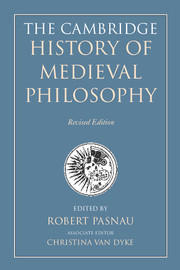Book contents
- Frontmatter
- Contents of Volume 1
- Preface
- List of contributors
- Frontmatter
- Contents of Volume 2
- Introduction
- I Fundamentals
- II Logic and language
- III Natural philosophy
- IV Soul and knowledge
- V Will and desire
- VI Ethics
- VII Political philosophy
- VIII Metaphysics
- IX Theology
- 50 Philosophy and theology
- 51 Faith and reason
- 52 Mysticism
- 53 Arguments for god’s existence
- 54 Describing god
- 55 Providence
- 56 The problem of evil
- Appendices
- Bibliography of primary sources
- Bibliography of secondary sources
- Index nominum
- Index rerum
- References
55 - Providence
from IX - Theology
Published online by Cambridge University Press: 05 August 2014
- Frontmatter
- Contents of Volume 1
- Preface
- List of contributors
- Frontmatter
- Contents of Volume 2
- Introduction
- I Fundamentals
- II Logic and language
- III Natural philosophy
- IV Soul and knowledge
- V Will and desire
- VI Ethics
- VII Political philosophy
- VIII Metaphysics
- IX Theology
- 50 Philosophy and theology
- 51 Faith and reason
- 52 Mysticism
- 53 Arguments for god’s existence
- 54 Describing god
- 55 Providence
- 56 The problem of evil
- Appendices
- Bibliography of primary sources
- Bibliography of secondary sources
- Index nominum
- Index rerum
- References
Summary
Two texts framed medieval Christian discussions of the idea that God exercises providential care and governance over the created order: the biblical Book of Wisdom and Boethius’s Consolation of Philosophy. In the Book of Wisdom, the term ‘providence’ occurs at 6:17, where Wisdom “presents herself in all providence,” and again at 14:3, which says: “Father, your providence rules because you have provided a way even on the sea and a most solid path among the waves.” These passages provided both warrant and mandate for theologians to investigate how God’s omniscience and omnipotence were manifest in the providential governance of the created order; it was Boethius, however, who set the philosophical parameters for that investigation.
Boethius defines God’s providence as the “unfolding of temporal events as this is present to the vision of the divine mind” (Consolation IV prose 6). He goes on to claim that:
Fate moves the heavens and the stars, governs the elements in their mixture, and transforms them by mutual change; it renews all things that are born and die by the reproduction of similar off-spring and seeds. This same power binds the actions and fortunes of men in an unbreakable chain of causes and, since these causes have their origins in an unchangeable providence, they too must necessarily be unchangeable. In this way things are governed perfectly when the simplicity residing in the divine mind produces an unchangeable order of causes. This order, by its own unchanging nature, controls mutable things which otherwise would be disordered and confused.
(ibid.)- Type
- Chapter
- Information
- The Cambridge History of Medieval Philosophy , pp. 761 - 772Publisher: Cambridge University PressPrint publication year: 2014

